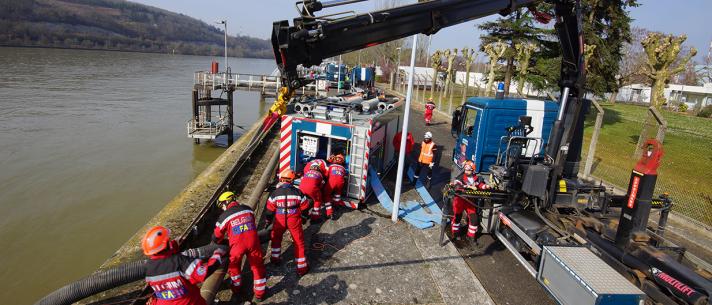Overview
The National Crisis centre, Ministry of Home Affairs, is responsible for the coordination of the emergency planning and crisis management policy.
Emergency planning and management in Belgium is implemented at 3 different levels: municipal, provincial, or federal level. At each level generic and risk specific emergency plans are drawn up.
The level at which a crisis is managed is based on a multitude of criteria, such as geographical extent, number of victims, environmental impact, etc.
Emergencies are coordinated at national/federal level if, e.g., 2 or more provinces are involved or the means available to the provincial governor within their competence of coordination are insufficient.
In the federal phase of emergency planning, the Minister of Home Affairs initiates national coordination and promulgation.
Starting at the federal phase, 3 bodies are activated within the National Crisis centre: an evaluation and assessment, a coordination, and an information cell. Each one contributes to the overall decision process within their respective competence.
Prevention
Overview
Every federal government service (transport, energy) must set up a departmental crisis cell in charge of emergency preparedness. This department takes care of preparing measures to manage an emergency and actions for business and service continuity in its field of activity while coordinating critical processes of every service.
In addition, all necessary legislative and procedural actions to prevent shortage or disruption of critical infrastructure are taken by the federal or regional department responsible for the specific sector in which shortage or disruption is likely to occur.
In link with disaster risk management, since 2010, Belgium has had a national adaptation strategy that led to establishing a national adaptation plan, developed by the federal government and the regions. It identifies specific adaptation measures that need to be taken at a national level to strengthen cooperation and create synergies between the different entities on adaptation.
In addition, the regional and the federal governments have all adopted adaptation plans. The national and federal adaptation plans identify adaptation measures in the disaster risk management sector.
Risk assessment
In 2018, the National Crisis Centre (NCCN) coordinated a large-scale risk assessment for Belgium for the period 2018-2023.
With this Belgian National Risk Assessment 2018-2023, the NCCN wants to identify and evaluate the major risks to which Belgium may be exposed in a structured and scientifically correct manner.
The NCCN is currently working on the next iteration of the Belgian National Risk Assessment (BNRA), which will assess the relevant risks to which Belgium may be exposed during the period 2023-2026.
Risk management planning
The Belgian Crisis Centre works with the risk cycle.
Risk communication and awareness raising
A special website is dedicated for risk communication towards the public.
Preparedness
Training and exercises
All actors engaged with emergency management, be it at the operational or at the strategic level, are trained within their specific institution or service and, through dedicated courses, together with other emergency actors.
All intervention services exercise on a regular basis their capacities and its interactions and integrations with other potential stakeholders. At the strategic level the emergencies plans are exercised on a regular basis. For specific risks such as the nuclear risk the type of exercises and its rime is fixed by law.
A cross-sectoral pool of experts is trained within the EU Civil Protection Mechanism training and exercise programme. They perform all necessary actions in the frame of host nation support and requesting and offering international assistance.
EU Civil Protection Mechanism modules are trained and certified and intervene in Belgium.
Early warning systems
In 2014, the Crisis Centre launched the BE-Alert pilot project. For 2 years, 33 municipalities could test and evaluate BE-Alert and thus make improvements. At present, all authorities in the country have an alarm system to ensure the safety of their residents.
Since 2017, BE-Alert has been operational throughout Belgium. Currently, more than 1 million addresses are already registered and 85% of the municipalities are already registered on BE-Alert.
BE-Alert is an ongoing project. Belgium continues to search for new technologies and channels to alert people wherever they are.
Emergency Response
At operational level, each emergency is handled by intervention services. Their tasks are divided into 5 so-called disciplines (sectors) within a command post.
Each one of these disciplines is competent/responsible for a specific set of tasks and draws up a mono-disciplinary intervention plan that outlines their own modus operandi.
The 5 disciplines in the Belgian Emergency response are:
- Assistance operations
- Medical, sanitary and psychosocial assistance
- Police tasks
- Logistical support
- Information to the public
Cross-border, European and international cooperation
At local level different border municipalities and fire service intervention zones have established agreements with their neighbouring municipality or intervention zones to organise cross border assistance.
Such cooperation agreements also exist at the national level with Belgium’s neighbouring countries.
At subnational and international level, Belgium is also an active partner in the Benelux collaboration, the Union Civil Protection Mechanism, NATO, the Network of Directors-General of European Crisis Centres and several European and international projects.
Facts & figures
General contact point:
Ministry of Home Affairs
Directorate-general for Civil Protection (DGCP)
Leuvenseweg 1
1000 Brussel (Belgium)
dgcpint@ibz.fgov.be
National Crisis Centre (NCCN)
Hertogsstraat 53
1000 Brussel (Belgium)
https://crisiscentrum.be/en/contact

